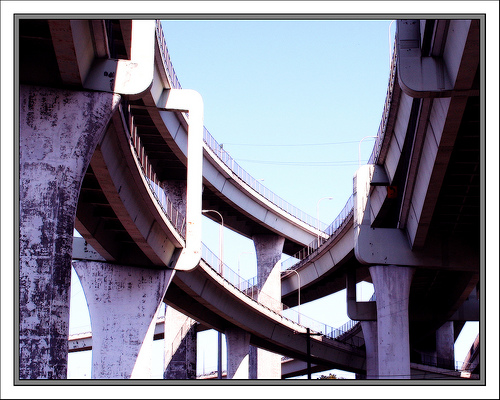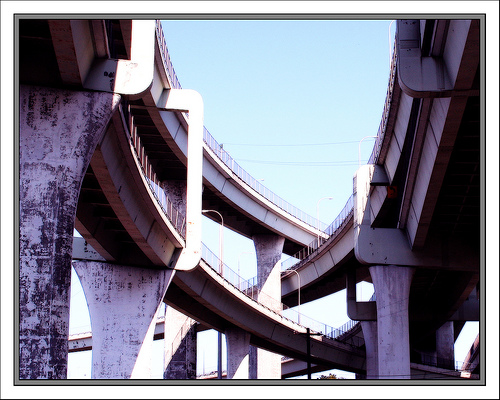 Getting out from under “the myth of the self-financed road.”Photo: egazelleHighway users, self-sufficiently paying their own way as they motor down the nation’s roads. Transit users, always asking for a government handout so that they can ride their subways and buses.
Getting out from under “the myth of the self-financed road.”Photo: egazelleHighway users, self-sufficiently paying their own way as they motor down the nation’s roads. Transit users, always asking for a government handout so that they can ride their subways and buses.
It’s an old stereotype that’s been used to starve transit and fatten roads for generations. And it just isn’t true.
Now it’s time for a thorough debunking. Tanya Snyder reports on Streetsblog Capitol Hill:
The myth of the self-financed road meets its match today in the form of a new report from the U.S. Public Interest Research Group: “Do Roads Pay For Themselves?” The answer is a resounding “no.” All told, the authors calculate that road construction has sucked $600 billion out of America’s public purse since the dawn of the interstate system.
U.S. PIRG’s report takes down the “self-financed roads” canard point by point. It makes it clear that user fees do not pay for new roads (“user fees paid for only 51 percent of highway costs, down 10 percent over the course of a single decade”). And it takes a hard look at the external costs of driving, from environmental pollution and related health impacts to the myriad negative effects of the sprawl that all these roads enable.
As Snyder writes, the report comes out at a crucial time:
With a Republican majority in the House, the myth that roads pay for themselves will be again be enlisted to prioritize highways over transit, as the GOP begins shaping a transportation agenda around “getting back to basics” and cutting spending, especially for transit.
“We want to make sure that those falsehoods are not a part of this debate,” said [U.S. PIRG’s Dan] Smith. “People will think twice before saying roads pay for themselves when the numbers say they don’t.”
There are some conservatives speaking out about these facts as well. Last year, I interviewed William Lind, director of the American Conservative Center for Public Transportation, who told me that he is dedicated to educating his fellow Republicans on the truth about road subsidies versus transit subsidies. Here’s what Lind told me then:
[It is to us] a bizarre notion that we hear from so many Republican candidates and officeholders, that says public transportation, particularly rail, is somehow left-wing, and if you’re a conservative you want highways. These are not ideological issues. They’re technical issues, and they need to be dealt with as such. …
[W]e try to point out to [Republicans] that this isn’t just for someone else, but good public transit is something that the people who vote for them use and want and increasingly need. This kind of political lag, of course, is not uncommon. I am, in the short term, not optimistic, because again a lot of the incoming Republicans will have bought the libertarian line, that transit is subsidized and highways are not. Factually, that couldn’t be more wrong.
Factually is the key word here. We’ll soon find out if the new Congress thinks that way at all.



